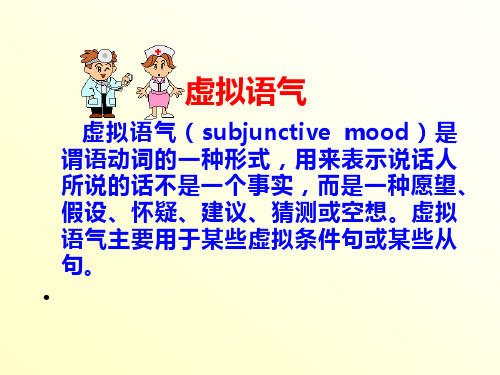中考英语语法复习课件虚拟语气
英语语法专题讲座-虚拟语气

第二节
名词性从句中的虚拟语气
一、虚拟语气用于主语从句中 It is (was) important (necessary, desirable, imperative, advisable, incredible, urgent, possible, essential, natural, preferable, insistent, crucial, better, best, ridiculous, vital) that…
英语语法专题讲座 虚拟语气
第一节 非真实条件句中的虚拟语气
if引导的非真实虚拟条件句表示的假设是 不可能发生或实现的,主句和从句谓语 动词都用虚拟式。 以动词以do为例(be的形式为were),主 要有三种基本形式:
假 设
从句
主句 should(would, could,might)do should(would, could,might) have done should(would, could,might)do
与现在事实相反 did/were 与过去事实相反 had done
与将来事实相反 did/should do/were to do
虚拟语气的基本用法
If we left now, we should arrive in good time. (与现在事实相反) If he had been here, he might have been able to help us. (与过去事实相反) If you did that again, we wouldn't allow you to work with us. (pity (shame, wonder, must, suggestion, proposal, requirement, request, desire, order, recommendation) that…,
初中英语语法知识点——虚拟语气

初中英语语法知识点——虚拟语气虚拟,在汉语中表示一种假设的,不存在的情况,同样,英语中虚拟语气是用来表示说话人的主观愿望或假想,而不表示客观存在的事实,所说的是一个条件,不一定是事实,或与事实相反。
虚拟语气通过谓语动词的特殊形式来表示。
在初中阶段,虚拟语气一般用于下列情况:一、条件状语从句1、与现在事实相反若与现在事实相反,虚拟语气的条件从句的谓语用过去式(be通常用were),主句谓语用“should (would, could, might)+动词原形”。
如:If I were you, I would take an umbrella. 如果我是你,我会带把伞。
(事实上我不可能是你)If I knew her number I could ring her up. 要是我知道她的电话号码,我就可以给她打电话了。
(事实上我不知道)2、与过去事实相反若与过去事实相反,从句:主语+had done ,主句:主语+should/would/could/might+have done,例如:If I'd left sooner,I'd have been on time. 要是我早点动身,我就准时到了。
(但我动身太迟了)If I had got there earlier, I should/could have met her. 如果我早到那儿,我就会见到她。
(事实:去晚了)3、与将来事实相反从句:①if+主语+were to do 主句:①主语+should/would/could/might+do②if+主语+did/were ②主语+should/would/could/might+do③if+主语+should+do ③主语+should/would/could/might+do例如:If he went,would you go too? 如果他去,你也去吗?(大概他不会去) If he should come here tomorrow, I would talk to him. 如果他明天来这儿的话,我就跟他谈谈。
英语语法专题:虚拟语气课件(20张ppt)

语气:谓语动词的一种形式,表示说话人的态度和意图.
分类:陈述语气(现实,符合事实)
祈使语气(说话人的建议,请求,命令,邀请)
虚拟语气(动作或状态不是事实,或者是不可能发生的情况,
而是说话人的一种愿望,建议,命令,假设或推测)
e.g. I am a student, so I study hard. 陈述
注2:错综时间条件句
如果虚拟条件主句和从句的动作发生的时间不一致,主句和从句的
谓语动词要根据各自所指的不同时间选择适当的动词形式, 如:
If I were you, I would not have missed the film last
night.
(现在----过去)
If they had started in the early morning, they would arrive in half
“If I could… ,I would…. ” or
“If I were …,I would….”
二. 虚拟语气在名词性从句中的用法 (主,宾,表,同位)
1.宾语从句 a. wish+宾语从句,表示很难实现的愿望
现在 过去 将来
过去式(be动词用were)
过去完成时,或could/would +have done could/would +动词原形
A. was worried
B. should be worried.
4. The teacher insisted Tom ______ to Lily, but Tom insisted
3. If you had come yesterday, you would have met him.
虚拟语气完整课件

在宾语从句中的使用
01
在某些动词后的宾语从句中,需 要使用虚拟语气,如suggest、 propose、demand等。
02
虚拟语气在宾语从句中的形式与 条件状语从句中的形式相同,根 据所表示的时间不同,使用不同 的动词形式。
在主语从句中的使用
在主语从句中,有时需要使用虚拟语 气,尤其是表示建议、要求、命令等 含义的主语从句。
07
CATALOGUE
虚拟语气在英语口语中的应用
在日常对话中的应用
日常建议
在给朋友提供建议时,可以使用 虚拟语气来表达更委婉的建议,
例如“If I were you, I would consider postponing the meeting.”
礼貌拒绝
当需要拒绝对方请求时,可以使用 虚拟语气来表达更加委婉的语气, 例如“I wish I could help you, but I'm afraid I can't.”
在虚拟语气中,如果所描述的情况是与将来事实相反的,那么条件句可以使用would+动词原形,主句使用 would+动词原形。例如:“If you would come tomorrow, we would have the meeting.”
混合虚拟语气
总结词
表示与过去、现在或将来事实相反的情 况
VS
,提高自己的语法运用能力。
06
CATALOGUE
虚拟语气在英语写作中的应用
在议论文中的应用
要点一
总结词
在议论文中,虚拟语气常用于表达假设条件或个人观点, 强调与事实相反的情况。
要点二
详细描述
在议论文中,作者可以使用虚拟语气来提出与现实相反的 情况,以强调自己的观点或反驳对方的观点。例如,“假 如没有环保法规,环境将遭受更严重的破坏。”通过使用 虚拟语气,作者能够更清晰地表达自己的立场和论点。
虚拟语气 课件高考英语语法复习专题

与过去事实相反
过去完成时 had done
I would rather you _c_a_m__e_(come) here now. I would rather you _c_a_m__e_(come) here tomorrow.
I would rather you _h_a_d__n_’t_t_o_ld_ (not tell)me the truth yesterday.
宾语从句
14
(一). 宾语从句
我们建议Tom 去休息一下。 他坚持要我与他同行。 他们要求派Tom去那儿工作。 老师要求作业要及时完成。
We suggested _(_th__a_t)_T__o_m__h_a_v_e_a__r_e_st. He insisted _(t_h_a_t_)_I_(_s_h_o_u_ld__)_g_o__w_i_th__h_i_m_ . They requested (that) Tom _(_s_h_o_u_l_d_)_b_e_s_e_n_t_t_o_w__o_r_k_t_h_e_r_e_______ .
that不可省略
• It is suggested that we (should) practise reading English everyday.
16
这些动词相对应的名词性从句也用should do
(三).表语从句
• The / One’s insistence / order / command / suggestion / advice / proposal / recommendation / request / requirement / demand / desire is / was that … (should) do
初中英语语法重难点专项讲解之虚拟语气

初中英语语法重难点专项讲解之虚拟语气虚拟语气表示说话人的愿望、假设、猜测或建议,而不是事实。
虚拟语气是通过句中的谓语动词的特殊形式来表现的,因此,掌握虚拟语气中的各种谓语动词的形式变化,是掌握虚拟语气的关键。
一、虚拟语气在简单句中的用法虚拟语气用于简单句中,一般表示祝愿、命令等。
谓语动词要用原形。
二、虚拟语气在主从复合句中的用法(1)在状语从句中的用法1、条件句中的用法虚拟语气的条件句是用谓语动词的特殊形式来表现与现在、过去事实相反的情况或对将来发生的情况表示怀疑,和直陈语气条件句中的谓语动词形式以及表达的含义完全不同。
虚拟语气条件句中所用的谓语动词的过去时、过去完成时、过去将来时等,只表示不同的虚拟语气,和直陈语气的过去时、过去完成时、过去将来时等毫无关系。
现将虚拟语气的各种具体形式和用法分述如下;a. 表示与现在事实相反的情况①形式条件从句的动词形式主句的动词形式If I (we,you,he,she,it,they)+行为动词的过去式(be的过去式一般用were) I (we) should You (he,she , +动词原形或:they,it ) would所有人称+might(could)+动词原形②用法:If I had more time, I should study German.(fact:I have no more time, so I shall not study German. )If she were not so busy, she would attend the meeting this afternoon.(fact:she is very busy, so she will not attend the meeting this afternoon.)If they didn’t take physical exercises every day, they wouldn’t be so healthy.(fact: they take physical exercises every day, so they are very healthy.)b. 表示与过去誓死相反的情况①形式;条件从句的动词形式主句的动词形式If I (we,you,he,she,it,they)+had+过去分词 I (we) shouldYou (he,she , +have+过去分词或:they,it ) would所有人称+could(might)+have+过去分词②用法:I would have checked my paper again if I had had more time at yesterday’s examination.(fact:I had no more time at yesterd ay’s exam, so I didn’t check my paper again)You would have already recovered from his illness if he had seen the doctor in good time.(fact: He didn’t see the doctor in good time ,so he hasn’t recovered from his illness )c. 表示与将来事实相反的情况①形式:条件从句的动词形式主句的动词形式a. If I (we,you,he,she,it,they)+行为动词的过去式(be的过去式一般用were)通常要与一个表将来的时间的状语连用b. If (we,you,he,she,it,they)+should+动词原形c. If I (we,you,he,she,it,they)+were to+动词原形 I (we) should You would +动词原形或:he(she,it ) would they wouldI (we,you,he,she,it,they)+could(might)+动词原形②用法:If it rains tomorrow, our picnic will be put off.(The weather has been changeable these days.)If it rained tomorrow, our picnic would be put off.( The weather has beenvery good these days.)If it should rain tomorrow, our picnic would be put off.(That would be out of our expectation.)If it were to rain tomorrow, our picnic would be put off. (条件从句谓语动词用were to +动词原形,表示下雨的可能性极小。
中考英语二轮复习虚拟语气课件(共65张PPT)

If there should/ were to be something wrong, they would/ could/ might tell you at once.如果有什么问题,他们会马上告诉 你的。
【Example】
If she were to be here next Monday, I would tell her about the matter.
2.虚拟语气在假设 过去情况 的条件句中的用法 在表示对过去情况假设的非真实条件句中, 从句的谓语动词用过去完成式,即“had+过去分词”的形式, 主句谓语用“should/ would/ could/ might+have+过去分词”的形 式,should用于第一人称,would可用于各个人称。
If+主语+should+动词原形
eg: If it wIefr+e主to语r+awinerteomtoo+r动ro词w,原th形e meeting would be put
off.
1.虚拟语气在假设 现在情况的条件句中的用法 在表示对现在情况假设的非真实条件句中, 从句的谓语动词用过去式,如果出现be,则采用were的形式,
【Example】
If you had gone to the lecture last Saturday, you would have benefited a lot from it.
A. had gone; would have benefited B. had gone; would benefit C. were; would benefit D. were; would have benefited
中考英语语法之虚拟语气

中考英语语法之虚拟语气虚拟语气是英语语法中的一个重要知识点,它用来表示与事实相反、与现在事实相反、与过去事实相反、与将来事实相反等非真实情况。
掌握虚拟语气的正确运用,对于提高中考英语的语法水平起到至关重要的作用。
本文将详细介绍虚拟语气的用法和例子,帮助同学们更好地理解和记忆。
1. 表示与事实相反的虚拟语气与事实相反的虚拟语气用于表示与现在或过去实际情况相反的假设情况。
常见句型有:1)If + 主语 + 动词过去式(be动词用were),主语 +would/should/could/might + 动词原形例:If I were a bird, I would fly high in the sky.如果我是一只鸟,我会在天空中自由飞翔。
2)It's time + 主语 + 动词过去式,主语 + did/were例:It's time he went to bed.该他上床睡觉的时间了。
3)as if/though + 主语 + 动词过去式,主语 +would/should/could/might + 动词原形例:He behaves as if he were the boss.他的行为就像是老板一样。
2. 表示与现在事实相反的虚拟语气与现在事实相反的虚拟语气用于表示对现在情况的假设或希望。
常见句型有:1)If + 主语 + did,主语 + would/should/could/might + 动词原形例:If I had a car, I would drive to school.如果我有辆车,我会开车去上学。
2)I wish/if only + 主语 + 过去式,主语 + would/should/could/might + 动词原形例:I wish I could fly.我希望我会飞。
3. 表示与过去事实相反的虚拟语气与过去事实相反的虚拟语气常用于表达对过去情况的假设或遗憾。
人教版中考英语复习课件--虚拟语气

You didn’t come to the party, or we would have had a great time together. 你没有来参加聚会,不然我们会一起度过
一段美好的时光。(典)
❸在带有 with, without, but for 等介词短 语的句子中,常用虚拟语气表示与事实 相反的假设
情况 从句谓语形式
示例
表示对过 去事实的 假设
had + 动词的过 去分词
He behaved as if nothing had happened. 他表现得若无其事。(典)
表示对现 在事实的 假设
动词的过去式 (be 动词用 were)
I can remember our wedding as if it were yesterday. 我还记得我们的婚礼,仿佛它就在 昨天。(典)
虚拟语气在定语从句中的应用
在“It is (high / about) time + that 引导的从句 (that 可省略) .”句 型中,从句谓语的形式可为动词的过 去式,也可为“should + 动词原形” It’s high time that we did something to improve our environment. 到了我们为改善环境做些事情的时候
虚拟语气在宾语从句中的应用
❶表示坚持、命令、建议、要
求等意义的动词后接宾语从句 时,从句用虚拟语气,
其谓语的形式为“(should +) 动词原形”
I suggest you (should) ask him some specific questions about his past. 我建议你问他一些关于他过 去的具体问题。(典)
英语语法-虚拟语气

IV. clause
• 1. …suggest/propose/recommend/demand/ord er/command/desire/require/request/insist/stipulate/ adivised/decide that … (should) do… • 2. …suggestion/proposal/recommendation/de mand/order/command/desire/request/requirement/i nsistence/stipulation/advice/decision that …(should) do… • 3. It is/was advisable/desirable/suggested/requested/ordered/p roposed/decided that …(should) do
在It is /was +形容词后的that从句中 常用“should + 不定式”表示建议、惊奇等。每式英 语中省略should。这类常见的形容词有: advisable, appropriate, essential, necessary, possible, preferable, proper等。 It’s advisable that the Sport Meets be put off owing to the bad weather. 在使用if的代用语及其省略的句子中,后接过去式 常见代用语有:provided (that), supposing/suppose, in case of, otherwise等。 Supposing the ship were to sink, do you think there would be enough life jackets for all the passengers?
2010年中考英语语法复习精品课件--虚拟语气

_____ to do the work, I should do it some other day. A. If were I B. I were C. Were I D. Was I 答案C. 在虚拟条件状语中如果有were, shoul语气的从句中,动词‘ 的 在虚拟语气的从句中,动词‘be’的 过去时态一律用 “were”,不用 ,不用was, , 即在从句中be用 代替。 即在从句中 用were代替。 代替 If I were you, I would go to look for him. 如果我是你,就会去找他。 如果我是你,就会去找他。 If he were here, everything would be all right. 如果他在这儿,一切都会(错)You pale face suggests that you (should) be ill. (对) Your pale face suggests that 对 you are ill. (错) I insisted that you ( should) be 错 wrong. (对) I insisted that you were wrong. 对
had这三个词,通常将if省略,主语提前 变成 这三个词,通常将 省略 主语提前, 省略, 这三个词 were, should, had +主语的形式。但要注意, 主语的形式。但要注意, 主语的形式 在虚拟条件状语从句中, 在虚拟条件状语从句中,省略连词的倒装形式 的句首不能用动词的缩略形式。 的句首不能用动词的缩略形式。如我们可说 Were I not to do., 而不能说 Were ordered, proposed, required, demanded, requested, insisted; + (should) do ; (2) important, necessary, natural, strange a pity, a shame, no wonder (3)It is suggested that we (should) hold a meeting next week. It is necessary that he (should) come to our m对将来的假想: 表示对将来的假想
- 1、下载文档前请自行甄别文档内容的完整性,平台不提供额外的编辑、内容补充、找答案等附加服务。
- 2、"仅部分预览"的文档,不可在线预览部分如存在完整性等问题,可反馈申请退款(可完整预览的文档不适用该条件!)。
- 3、如文档侵犯您的权益,请联系客服反馈,我们会尽快为您处理(人工客服工作时间:9:00-18:30)。
注意: 注意:
(1) 在真实条件句中,主句不能用 ) 在真实条件句中, be going to表示将来,该用 表示将来, 表示将来 该用shall, will. (错) If you leave now, you are 错 never going to regret it. (对) If you leave now, you will 对 never regret it. (2) 表示真理时,主句谓语动词便 ) 表示真理时, 不用shall (will) +动词原形,而直接 动词原形, 不用 动词原形 用一般现在时的动词形式。 用一般现在时的动词形式。
在条件句中的应用: 二、 在条件句中的应用: 条件句可分为两类, 条件句可分为两类, 一类为真实条件句, 一类为真实条件句,一类 为非真实条件句。 为非真实条件句。非真实 条件句表示的是假设的或 实际可能性不大的情况, 实际可能性不大的情况, 故采用虚拟语气。 故采用虚拟语气。
1、 真实条件句: 、 真实条件句: 真实条件句用于陈述语气, 真实条件句用于陈述语气, 假设的情况可能发生, 假设的情况可能发生,其中 if 是 如果的意思。 如果的意思。 时态关系: 时态关系:
典型例题: 典型例题:
to do the work, I should do it some other day. A. If were I B. I were C. Were I D. Was I 答案C. 在虚拟条件状语中如果有were, should, 答案 在虚拟条件状语中如果有
(1) suggested, ordered, proposed, required, demanded, requested, insisted; + (should) do ; (2) important, necessary, natural, strange a pity, a shame, no wonder (3)It is suggested that we (should) hold a meeting next week. It is necessary that he (should) come to our meeting tomorrow.
4、 虚拟条件句的倒装: 、 虚拟条件句的倒装:
虚拟条件句的从句部分如 果含有were, should, 或had, 果含有 可将if省略 再把were, 省略, 可将 省略,再把 should或had 移到从句句首, 移到从句句首, 或 实行倒装。 实行倒装。
Were they here now, they could help us. =If they were here now, they could help us. Had you come earlier, you would have met him. =If you had come earlier, you would have met him. Should it rain, the crops would be saved. =Were it to rain, the crops would be saved.
6、wish的用法。 、 的用法。 的用法
后面的从句, (1)用于 )用于wish后面的从句,表示与 后面的从句 事实相反的情况, 事实相反的情况,或表示将来不太 可能实现的愿望。 可能实现的愿望。其宾语从句的动 词形式为: 词形式为:
2、非真实条件句: 、非真实条件句:
(1)时态:可以表 )时态: 示过去, 示过去,现在和将来 的情况。 的情况。它的基本特 点是时态退后。 点是时态退后。
a. 同现在事实相反的假设。 同现在事实相反的假设。
句型 :条件从句 一般过去时 主句 should( would) +动词原形 动词原形
3、 混合条件句: 、 混合条件句:
主句与从句的动作发生在不同的时间, 主句与从句的动作发生在不同的时间, 这时主, 这时主,从句谓语动词的虚拟语气形式 因时间不同而不同,这叫做混合条件句。 因时间不同而不同,这叫做混合条件句。 If you had asked him yesterday, you would know what to do now. 从句与过去事实相反, (从句与过去事实相反,主句与现在事 实相反。) 实相反。) If it had rained last night (过去 it would 过去), 过去 be very cold today (现在 现在). 现在
c.表示对将来的假想: 表示对将来的假想: 表示对将来的假想
句型: 句型:条件从句 一般过去时 were+ 不定式 主句 should+ 动词原形 would + 动词原形 should+ 动词原形
If you succeeded, everything would be all right. If you should succeed, everything would be all right. If you were to succeed, everything would be all right.
5、特殊的虚拟语气词:should。 、特殊的虚拟语气词: 。
(1) It is demanded / necessary / a pity ) + that…结构中的主语从句的谓语动词要 结构中的主语从句的谓语动词要 加动词原形, 可省略。 用should 加动词原形, should 可省略。 句型: 句型: suggested It is important that…+ (should) do a pity
例如: 例如: If they were here, they would help you.
b. 表示于过去事实相反的假设。 表示于过去事实相反的假设。
句型: 句型:条件从句 主句 过去完成时 should (would) have+ 过去分词
If she had worked harder, she would have succeeded. The rice would not have been burnt if you had been more careful. If my lawyer had been here last Saturday, he would have prevented me from going.
判断改错: 判断改错
(错)You pale face suggests that you (should) be ill. (对) Your pale face suggests that 对 you are ill. (错) I insisted that you ( should) be 错 wrong. (对) I insisted that you were wrong. 对
注意: 注意:
如suggest, insist不表示 "建议 不表示 建议 " 或"坚持要某人做某事时 , 坚持要某人做某事时", 坚持要某人做某事时 即它们用于其本意"暗示 暗示、 即它们用于其本意 暗示、表 坚持认为"时 明"、"坚持认为 时,宾语从 、 坚持认为 句用陈述语气。 句用陈述语气。 The guard at gate insisted that everybody obey the rules.
(2)在宾语从句中的应用: )在宾语从句中的应用:
在表示命令、建议、 在表示命令、建议、要求等一类动词后 面的从句中。 面的从句中。 order, suggest, propose, require, demand, request, insist, command, insist + (should) do I suggest that we (should) hold a meeting next week. He insisted that he (should ) be sent there.
句型: 句型:条件从句 主句 一般现在时 shall/will + 动词原形
例如: 例如: If he comes, he will bring his violin.
典型例题: 典型例题:
The volleyball match will be put off if it . A. will rain B. raiቤተ መጻሕፍቲ ባይዱs C. rained D. is rained 答案B。 答案 。真实条件句主句为将 来时,从句用一般现在时。 来时,从句用一般现在时。
注意: 注意:
在虚拟语气的从句中,动词‘ 的 在虚拟语气的从句中,动词‘be’的 过去时态一律用 “were”,不用 ,不用was, , 即在从句中be用 代替。 即在从句中 用were代替。 代替 If I were you, I would go to look for him. 如果我是你,就会去找他。 如果我是你,就会去找他。 If he were here, everything would be all right. 如果他在这儿,一切都会 如果他在这儿, 好的。 好的。
